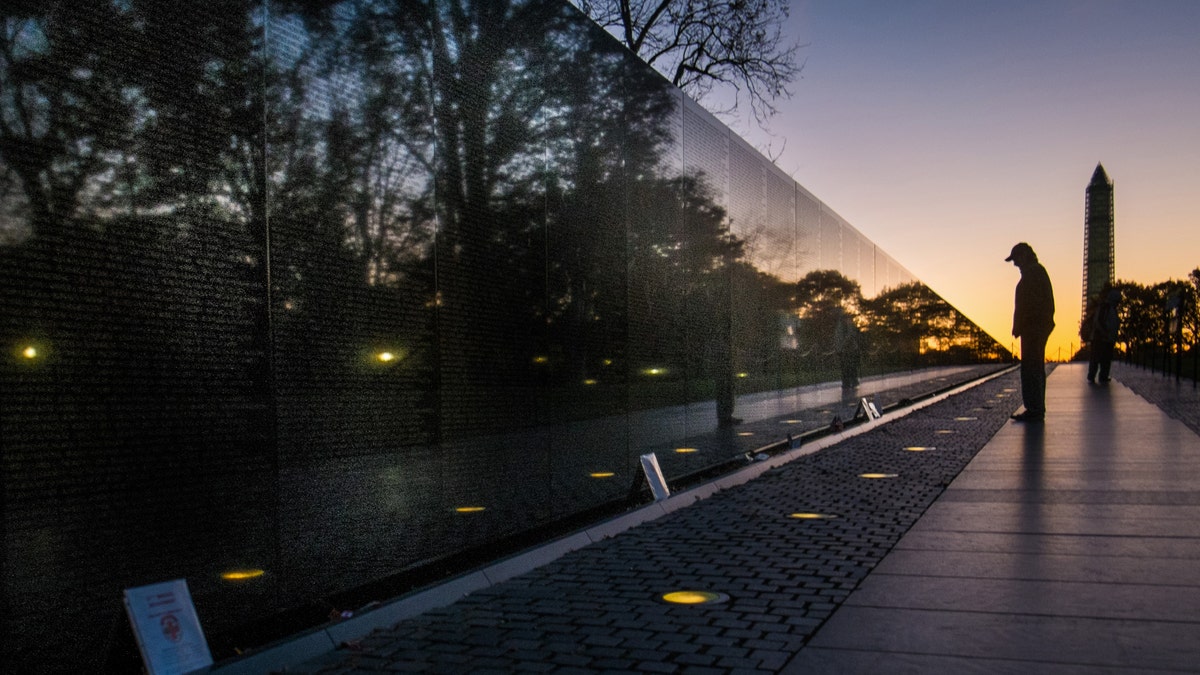
A visitor at the Vietnam War Memorial in Washington passes early in the morning on Veterans Day, Monday, to look at the names inscribed on the wall. (AP Photo/J. David Ake)
For veterans seeking mental health treatment, a lot of emphasis has been placed on developing therapies post-traumatic stress disorder, a condition characterized by frequent flashbacks and nightmares that are triggered by a terrifying event.
But according to Dr. Bradley Karlin, the national mental health director for the U.S. Department of Veterans Affairs (VA), another serious mental health condition affecting veterans often goes unnoticed: clinical depression.
If not addressed properly, depression can have very significant health implications for older generations – including poor quality of life, increased mortality, increased suicide rates, and delay in recovery from mental illness.
In order to provide better options for people battling this condition, Karlin and fellow researchers at the VA have revealed that cognitive behavioral therapy is an effective treatment option for both younger and older veterans battling depression.
“Depression among veterans is generally speaking about the second most common mental health diagnosis among individuals who are seeking treatment within the VA health care system,” Karlin told FoxNews.com. “... This is one of the first studies to look at the extent to which older versus younger adults benefit from cognitive behavioral therapy and to do so in a large, diverse national sample, and specifically within veteran populations.”
Cognitive behavioral therapy (CBT) is a form of psychotherapy that focuses on the integral relationship between a person’s thoughts and behaviors – and how they contribute to the cycle of depression. Patients who undergo CBT learn to take an active role in their treatments by learning new skills to help them change their patterns of thinking and behavior that contribute to their depression symptoms.
“We often say according to the CBT model, that individuals with depression – young and old – generally look through distorted lenses, if you will, that cultivate their perception of their lives and the things around them. And so CBT helps to correct that cognitive prescription and help them to see the world in a more realistic way,” Karlin said.
According to Karlin, previous randomized controlled studies of CBT have found it to be an effective form of treatment for depression and other mental health conditions. However, patients who seek treatment for depression often do not receive CBT, as there are very few mental health professionals in the United States who offer it, due to limited opportunities for professionals to receive competency-based training this area.
Additionally, Karlin said there hasn’t been much research on the benefits of CBT for older individuals with depression because of the stigma associated with mental illness in older generations.
“Many older adults often grew up at a time when mental illness was characterized in very different ways, and mental health treatment consisted of much different types of approaches,” Karlin said. “…Older individuals also typically grew up in a time when self-resilience and getting through challenging situations and circumstances on one’s own were important and emphasized. So they might be less likely to reach out for help because they think they should be able to manage this on their own.”
In an attempt to provide older veterans with the care they need and de-stigmatize treatment for depression, the VA has developed a national initiative to disseminate and implement CBT and 15 other evidence-based psychotherapies. As part of this initiative, Karlin and his colleagues have developed national competency-based training programs for these therapies and have trained 7,500 mental health professionals in one or more of these evidence-based psychotherapies.
In order to evaluate the success of this initiative, Karlin analyzed 864 veterans – 100 who were 65 and older and 764 who were between 18 and 64 – who were receiving CBT for depression (CBT-D) through the Veterans Health Administration. The CBT-D treatment protocol was developed specifically for veterans and those in the military, and it was intended to be administered in approximately 12 to 16 individual sessions.
Overall, 68 percent of the 864 veterans completed all the sessions or finished early due to speedier relief of symptoms. Of the individuals who finished the CBT sessions, there was an average reduction of 40 percent in their Beck Depression Inventory-II scores – measurements used by mental health professionals to assess the severity of a patient’s depression symptoms.
According to Karlin, these findings show that relatively new psychotherapies such as CBT can be integrated into routine clinical settings and show very promising results for younger and older veterans.
“We see veterans who have often been struggling for decades, especially these older veterans who are not necessarily experiencing depression for the first time,” Karlin said. “And we now have treatments, in this case CBT, that can really help them to reclaim their lives, and I think it’s really an important message for older as well as younger veterans that there are treatments that can help them.”
The research was published in The Journals of Gerontology, Series B: Psychological Sciences and Social Sciences.
